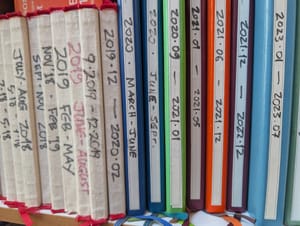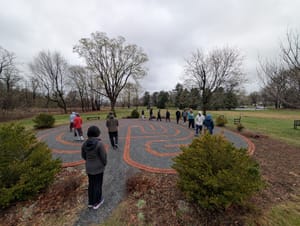Posting an unedited transcript, as I just did, is a disconcerting experience. It feels a little like taking off my journalistic clothes in public. For one thing, it reveals just how inarticulate I am when talking. Unlike Brian Lamb or Michael Krasny, I rarely ask questions that sound well-informed, well-rounded, and eloquent. Instead, my questions sound like this: “Well, so, um, what about that other thing?” And then the respondent goes on to talk for ten minutes.
Part of that is intentional: I figure I’m there to interview the subject, not the other way around, and once they start talking, it’s better if I just shut up and get out of the way. (The other part is that I’m just not that eloquent when speaking, in person — I’m much more comfortable expressing myself in writing.)
In the published version of an interview, I clean things up and insert questions that sound smarter — but they also help the reader, by setting up the interviewee’s replies better. Frankly, I find unedited transcripts a little hard to follow sometimes — you miss out on a lot of the nuance and gesture that forms the context of a live conversation. Editing attempts to make up for that, and that’s one of the reasons I like to let the edited interviews stand on their own.
But there’s a deeper reason why I don’t usually post transcripts.
Last week, Dave Winer wondered why journalists didn’t all just stop writing their stories, follow J.D. Lasica’s example, and post unedited transcripts for all to see.
The short answer: I don’t post my notes and transcripts for the same reason that Dave doesn’t post his source code. Interviews and notes are the reporter’s equivalent of source code. They are the framework, the blueprints, and raw data from which a story — and sometimes many stories — can be compiled. (Although transcripts and notes alone probably aren’t sufficient to compile a story, because much of the information is contained only in my own brain, and doesn’t actually get recorded until I write it into a story. But still — the analogy is good enough for my purposes.)
Collecting that raw data is one part of a reporter’s expertise. Assembling it into a coherent, understandable story is another part. Both, if done well, are competitive advantages that few journalists will give up willingly, except in part — just as few software publishers make all of their code open source.
What’s more, the law even recognizes this privileged status for journalists’ notes and sources, and protects them from public disclosure in most cases.
Besides, it’s not necessarily so easy to get a good understanding of a story from an unedited transcript. Sure, there are cases where a reporter takes a quote out of context — and this probably happens more often than writers or readers of the news care to admit. In such cases, a full transcript can help set the record straight. But the other side of the coin is that a good, honest writer performs a useful service by boiling down an interview into its salient points. Readers’ time is not unlimited. It comes down to trust vs. time: Do you trust the writer enough to summarize things for you? Or do you have enough time that you don’t need to trust the writer, and can wade through pages of notes and pages of conversation?
The same dynamic goes on in software development. It’s why most people prefer to download Windows or Mac executables (trusting the software publisher) rather than downloading source code, checking it for problems, and compiling their own software.
My feeling: Writers may, if challenged, release transcripts and notes as a way of lending credibility to their stories. (They might also choose to do it just for the hell of it, as I’ve done with my Cory Doctorow interview.) But this should be their choice. By the same token, sources who have been interviewed and who have made their own recordings of the interview — an increasingly common practice — may release their own transcripts in self-defense against being misquoted. But don’t expect every reporter to release every transcript, any more than you’d expect every software publisher to release the source code to all their programs.


